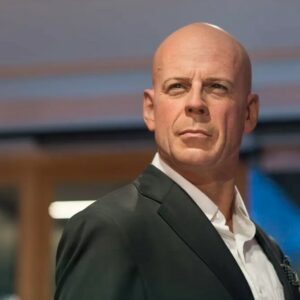In the realm of action movies, few lines have achieved the same level of cultural significance as Bruce Willis’s iconic “Yippee-Ki-Yay.” First introduced in Die Hard (1988), this catchphrase has since become an indelible part of modern cinema and pop culture. Though its delivery may seem simple, there is more to it than meets the eye. It is a masterstroke of character-building and world-building within the context of the film. Bruce Willis’s portrayal of John McClane, the everyman-turned-hero, helped immortalize this line, creating a unique blend of bravado, humor, and defiance. It is, in a sense, the very essence of what makes Die Hard—and the character of McClane—so memorable.
The origin of “Yippee-Ki-Yay” as an iconic catchphrase is rooted not just in its humorous delivery, but also in the timing and context of its usage. McClane’s quip occurs in a tense moment, as he faces off against the film’s antagonist, Hans Gruber (Alan Rickman). What begins as a moment of bravado quickly transforms into something much more enduring. The phrase is at once absurd and absurdly perfect for a character who defies the odds with a mix of humor and sheer determination. As audiences watched John McClane take on a group of terrorists with a mere handgun and sheer nerve, they were given a line that would echo throughout movie history. But how did this line become so iconic?
Cultural Impact: Beyond Die Hard
In the years since Die Hard hit theaters, “Yippee-Ki-Yay” has transcended the boundaries of the film and embedded itself deeply within the fabric of pop culture. Like many great catchphrases, it has taken on a life of its own, appearing in countless films, television shows, and advertisements. The phrase’s memorable nature lies in its oddity and simplicity, making it easy to recall, quote, and parody.
One of the key reasons for the phrase’s enduring popularity is its versatility. While it originated as an expression of McClane’s defiant spirit, it quickly became a tool for writers and directors to signal a character’s rebelliousness, cockiness, or ability to face adversity. It was a phrase that could be invoked in moments of triumph, or used sarcastically to mock an opponent or situation. The catchphrase found its way into various genres, from action comedies to dramas, proving its cultural adaptability.
It didn’t take long for “Yippee-Ki-Yay” to seep into television as well. Shows like The Simpsons and Friends have made reference to the line, either directly or through parody, showcasing its place in the collective consciousness of viewers. Even children’s cartoons such as The Powerpuff Girls have borrowed from the line’s cheeky defiance, illustrating how far-reaching its impact has been.
The commercial world, too, could not resist the power of such a memorable phrase. Advertisers have leveraged its rebellious undertone to sell everything from beer to cars, knowing that attaching the line to their products would evoke a sense of toughness and swagger. The phrase has become shorthand for a bold, fearless attitude—a symbol of independence and strength that resonates with a wide audience.
Catchphrase in Modern Media: Keeping the Line Alive
Even decades after its inception, “Yippee-Ki-Yay” remains a relevant and beloved part of modern media. Today, social media platforms have played a pivotal role in keeping this catchphrase alive. Thanks to Twitter, TikTok, Instagram, and other digital spaces, fans and content creators alike have kept the phrase at the forefront of entertainment conversations. Memes, references, and viral videos often incorporate “Yippee-Ki-Yay,” ensuring that it remains a fixture in both pop culture and everyday dialogue.
One of the most fascinating aspects of how the phrase persists in modern media is its usage in modern films. While no one has been able to fully replicate the magic of Bruce Willis’s delivery, directors and writers continue to reference the line in ways that pay homage to the original. In A Good Day to Die Hard (2013), the fifth installment of the Die Hard series, the catchphrase makes a return, signifying not just the ongoing legacy of the character but also the franchise’s self-awareness.
Social media trends have also bolstered the line’s relevance, as users incorporate it into their posts, often to comment on situations where individuals are facing adversity, danger, or even something as simple as a challenging workday. Its defiant spirit resonates with individuals looking for a quick, tongue-in-cheek way to express their resilience. This dynamic, fueled by the internet’s ever-evolving culture, ensures that “Yippee-Ki-Yay” will not fade into obscurity.
Bruce Willis’s Legacy: Cementing the Line as an Action Star Trademark
Bruce Willis’s portrayal of John McClane is one of the most iconic performances in action cinema, and the phrase “Yippee-Ki-Yay” is undeniably tied to his legacy. The line became not only McClane’s signature but also a defining feature of Willis’s career, encapsulating his unique charm and ability to blend humor with toughness. John McClane was not the typical larger-than-life hero, and “Yippee-Ki-Yay” reflected that. It was the kind of line that a character like McClane—an average cop in extraordinary circumstances—would say in the face of danger.
Before Die Hard, Willis was primarily known for his role in the TV sitcom Moonlighting. His ability to inject humor and wit into his characters made him a natural fit for the role of McClane. When audiences saw him in Die Hard, they were taken aback by his effortless cool and smart-mouthed heroism. He was tough, but never stoic or infallible. His moments of vulnerability and vulnerability mixed with sarcasm were highlighted perfectly through the line “Yippee-Ki-Yay,” which became a shorthand for the character’s everyman quality.
Willis’s delivery of the phrase in the context of Die Hard remains legendary. The line not only cemented McClane’s character as a fearless, irreverent hero, but it also reflected Willis’s own appeal as an actor who could be both tough and charming. The phrase encapsulated everything audiences loved about Willis’s brand of action heroism—his ability to save the day, often with little more than a witty one-liner and a few well-timed punches.
Why It Resonates with Audiences: Rebellion, Confidence, and Defiance
The enduring appeal of “Yippee-Ki-Yay” is not solely in its delivery or its use in various forms of media. It resonates deeply with audiences because it captures something fundamentally human—a desire to stand up against overwhelming odds with confidence, humor, and defiance. The phrase encapsulates the rebellious spirit of John McClane, a character who refuses to back down even when faced with the most harrowing circumstances. McClane’s journey in Die Hard is one of resistance, and the line comes to symbolize his refusal to be intimidated, even when he is outnumbered, outgunned, and exhausted.
In this sense, “Yippee-Ki-Yay” functions as both an expression of triumph and a declaration of resistance. It signals that, no matter how bad things get, the character is unbowed, unbroken, and ready to fight back with whatever resources they have at their disposal. It is this sense of invincibility—fueled by an unshakable belief in oneself—that resonates with audiences, and continues to do so even decades later.
Conclusion: The Enduring Legacy of “Yippee-Ki-Yay”
As we look back on the cultural impact of Bruce Willis’s “Yippee-Ki-Yay,” it is clear that the phrase has become much more than a simple catchphrase from an action movie. It has become a symbol of defiance, confidence, and resistance, embodying themes that transcend the context of Die Hard. Whether quoted in casual conversation, used in films, TV shows, or even advertisements, “Yippee-Ki-Yay” has endured as a memorable part of our lexicon.
The phrase continues to resonate because it speaks to the human desire to overcome adversity, to stand strong in the face of danger, and to do so with a sense of humor and rebellion. Bruce Willis’s portrayal of John McClane ensured that the line became inseparable from the very identity of the character and the actor. “Yippee-Ki-Yay” remains an iconic catchphrase—a touchstone for fans of action films and a testament to the lasting power of great cinema.





